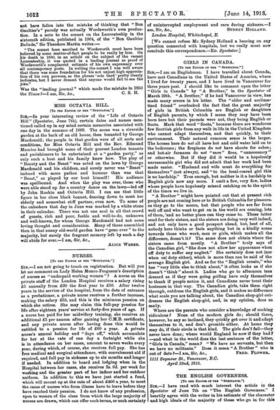NURSES.
[To THE EDITOR OF TEE "SPECTATOR."]
SIR,—I am not going to touch on registration. But will you let me comment on Lady Helen Munro-Ferguson's description of nurses as "underpaid working women" P A nurse on the private staff of the London Hospital receives a salary rising £5 annually from £30 the first year to £50. After twelve years in the service of the hospital, from the date of entrance as a probationer, a private nurse receives a further increase, making the salary £55, and this is the minimum pension on which she retires. She may claim this full-pay pension for life after eighteen years' service at forty-five years of age. If a nurse has paid for her midwifery training, she receives an additional £5 per annum after gaining her C.M.B. certificate, and any private nurse after having done this would be entitled to a pension for life of £60 a year. A private nurse's annual holiday and " days off," which accumulate for her at the rate of one day a fortnight while she is in attendance on her cases, amount to seven weeks every year, during which, of course, she receives full pay. She has free medical and surgical attendance, with convalescent aid if required, and full pay in sickness up to six months and longer if needed. In addition to board and lodging when in the Hospital between her cases, she receives 2s. 6d. per week for washing and the greater part of her indoor and her outdoor uniform. In addition to this we have just started a fund, which will mount up at the rate of about £400 a year, to meet the cases of nurses who from illness have to leave before they have reached their pension. I do not know of any profession, open to women of the class from which the large majority of nurses are drawn, which can offer such terms, or such certainty of uninterrupted employment and care during sickness.—I am, Sir, &e., SYDNEY HOLLAND. London Hospital, Whitechapel, E.
[We cannot refuse Mr. Sydney Holland a hearing on any question connected with hospitals, but we really must now conclude this correspondence.—ED. Spectator.]














































 Previous page
Previous page